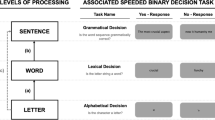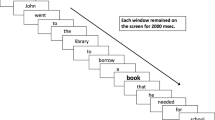Abstract
We examined whether university students who report a significant history of reading difficulties (RD; n = 24) differed from university students with no history of reading difficulties (NRD; n = 31) in how sentence context affects word recognition. Experiment 1 found no differences in how congruent sentence primes or syntactic manipulations of the sentence primes affected the performance of the two groups. However, only the RD group displayed a significant inhibition effect when the target word was preceded by an incongruent sentence prime. Experiment 2 found that the groups differed in how meaning frequency of the target word and context strength of the sentence prime affected word recognition latencies. The results suggest that the RD participants’ performance is context-sensitive and better explained by interactive models of language processing than by modular models.

Similar content being viewed by others
References
Aaron, P. G. (1989). Qualitative and quantitative differences among dyslexic, normal and nondyslexic poor readers. Reading and Writing: An Interdisciplinary Journal, 1, 291–308. doi:10.1007/BF00386263.
Ben-Dror, I., Pollatsek, A., & Scarpati, S. (1991). Word identification in isolation and in context by college dyslexic students. Brain and Language, 40, 471–490. doi:10.1016/0093-934X(91)90144-P.
Benjamini, Y., & Hochberg, Y., (1995). Controlling the false discovery rate: A new and powerful approach to multiple testing. Journal of the Royal Statistical Society, Series B, 57, 289–300.
Brown, J. I., Fishco, V. V., & Hanna, G. (1993). Nelson–Denny reading test. Chicago: Riverside Publishing Company.
Bruck, M. (1990). Word-recognition skills of adults with childhood diagnoses of dyslexia. Developmental Psychology, 26, 439–454. doi:10.1037/0012-1649.26.3.439.
Bruck, M. (1998). Outcomes of adults with childhood histories of dyslexia. In C. Hulme, & R.M. Joshi (Eds.), Reading and spelling: Development and disorders (pp. 179–200). Mahwah, NJ: Erlbaum.
Dixon, P., & Twilley, L. C. (1999). An integrated model of meaning and sense activation and disambiguation. Brain and Language, 68, 165–171. doi:10.1006/brln.1999.2075.
Duffy, S. A., Henderson, J. M., & Morris, R. K. (1989). Semantic facilitation of lexical access during sentence priming. Journal of Experimental Psychology. Learning, Memory, and Cognition, 15, 791–801. doi:10.1037/0278-7393.15.5.791.
Duffy, S. A., Kambe, G., & Rayner, K. (2001). The effect of prior disambiguating context on the comprehension of ambiguous words: Evidence from eye movements. In D. S. Gorfein (Ed.), On the consequences of meaning selection: Perspectives on resolving lexical ambiguity (pp. 27–43). Washington, DC: American Psychological Association.
Dunn, L. M., & Dunn, L. M. (1997). Peabody picture vocabulary test—Third edition. Circle Pines, MN: AGS Publishing.
Empirisoft (2003). DirectRT-v2003. New York, NY: Empirisoft Corporation.
Gallagher, A. M., Laxon, V., Armstrong, E., & Frith, U. (1996). Phonological difficulties in high-functioning dyslexics. Reading and Writing: An Interdisciplinary Journal, 8, 499–509. doi:10.1007/BF00577025.
Hogaboam, T. W., & Perfetti, C. A. (1975). Lexical ambiguity and sentence comprehension. Journal of Verbal Learning and Verbal Behavior, 14, 265–274. doi:10.1016/S0022-5371(75)80070-3.
Hopkins, K. A., Kellas, G., & Paul, S. T. (1995). Scope of word meaning activation during sentence processing by young and older adults. Experimental Aging Research, 21, 123–142. doi:10.1080/03610739508254273.
Kellas, G., Paul, S. T., Martin, M., & Simpson, G. B. (1991). Contextual feature activation and meaning access. In G. B. Simpson (Ed.), Understanding word and sentence (pp. 47–71). Amsterdam: Elsevier.
Lefly, D. L., & Pennington, B. F. (1991). Spelling errors and reading fluency in compensated adult dyslexics. Annals of Dyslexia, 41, 143–162. doi:10.1007/BF02648083.
Lucas, M. M. (1987). Frequency effects on the processing of ambiguous words in sentence contexts. Language and Speech, 30, 25–46.
Markwardt Jr., F. C. (1989). Peabody individual achievement test—Revised. Circle Pines, MN: American Guidance Service.
Psycholinguistic Database, M.R.C. Machine Usable Dictionary—Version 2.0. Oxford, UK: Oxford Text Archive. http://www.psy.uwa.edu.au/mrcdatabase/uwa_mrc.htm.
Parrila, R., & Corkett, J. Kirby & Hein, S. (2003). Adult Reading Questionnaire—Revised. Unpublished questionnaire, University of Alberta, Edmonton.
Paul, S. T., Kellas, G., Martin, M., & Clark, M. B. (1992). Influence of contextual features on the activation of ambiguous word meanings. Journal of Experimental Psychology. Learning, Memory, and Cognition, 18, 703–717. doi:10.1037/0278-7393.18.4.703.
Potter, M. C., Moryadas, A., Abrams, I., & Noel, A. (1993). Word perception and misperception in context. Journal of Experimental Psychology. Learning, Memory, and Cognition, 19, 3–22. doi:10.1037/0278-7393.19.1.3.
Raven, J. C. (1976). Standard progressive matrices. Oxford: Oxford Psychologists Press.
Sereno, S. C., Brewer, C. C., & O’Donnell, P. J. (2003). Context effects in word recognition: Evidence for early interactive processing. Psychological Science, 14, 328–333. doi:10.1111/1467-9280.14471.
Simpson, G. B. (1981). Meaning dominance and semantic context in the processing of lexical ambiguity. Journal of Verbal Learning and Verbal Behavior, 20, 120–136. doi:10.1016/S0022-5371(81)90356-X.
Stanovich, K. E., & West, R. F. (1981). The effect of sentence context on ongoing word recognition: Tests of a two-process theory. Journal of Experimental Psychology. Human Perception and Performance, 7, 658–672. doi:10.1037/0096-1523.7.3.658.
Stanovich, K. E., & West, R. F. (1983). On priming by a sentence context. Journal of Experimental Psychology. General, 112, 1–36. doi:10.1037/0096-3445.112.1.1.
Twilley, L. C., & Dixon, P. (2000). Meaning resolution processes for words: A parallel independent model. Psychonomic Bulletin & Review, 7, 49–82.
Vigliocco, G., & Hartsuiker, R. J. (2002). The interplay of meaning, sound, and syntax in sentence production. Psychological Bulletin, 128, 442–472. doi:10.1037/0033-2909.128.3.442.
Vu, H., Kellas, G., Metcalf, K., & Herman, R. (2000). The influence of global discourse on lexical ambiguity resolution. Memory & Cognition, 28, 236–252.
Walenski, M. (2003). Two predictions of a compound cue model of priming. Journal of Psycholinguistic Research, 32, 517–524. doi:10.1023/A:1025442231223.
West, R. F., Stanovich, K. E., & Cunningham, A. E. (1995). Compensatory processes in reading. In R. A. Dixon, & L. Backman (Eds.), Compensating for psychological deficits and declines: Managing losses and promoting gains (pp. 275–296). Hillsdale, NJ, England: Erlbaum.
Wilkinson, G. (1993). Wide range achievement test—Third revision (WRAT-3). Wilmington, DE: Jastak Associates.
Woodcock, R. W. (1987). Woodcock reading mastery test—Revised. Circle Pines, MN: American Guidance Service.
Author information
Authors and Affiliations
Corresponding author
Appendices
Appendix 1
Context sentences and targets words used in experiment 1
Congruent
-
1.
The wine was served from the decanter.
-
2.
The housewife waxed the linoleum.
-
3.
The mortician examined the cadaver.
-
4.
The baker smelled the aroma.
-
5.
The fisherman exceeded the quota.
-
6.
The accountant balanced the ledger.
-
7.
The team won the tournament.
-
8.
The preacher spread the gospel.
-
9.
The painter fell of the scaffold.
-
10.
The train went over the trestle.
-
11.
The artist painted the mural.
-
12.
The couple adopted the orphan.
-
13.
The barber trimmed the moustache.
-
14.
The hotel’s guests liked the accommodations.
-
15.
The carpenter drove in the spike.
-
16.
The waiter handed them the menu.
-
17.
The interpreter knew the dialect.
-
18.
The bartender served the cocktails.
-
19.
The pianist played at the recital.
-
20.
The sun was totally hidden by the eclipse.
Incongruent
-
1.
The politician appealed to the decanter.
-
2.
The wine was served from the linoleum.
-
3.
The fisherman exceeded the cadaver.
-
4.
The accountant balanced the aroma.
-
5.
The baker smelled the quota.
-
6.
The housewife waxed the ledger.
-
7.
The mortician examined the tournament.
-
8.
The biologist examined the gospel.
-
9.
The tree was uprooted in the scaffold.
-
10.
The country was ruled by the trestle.
-
11.
The train went over the mural.
-
12.
The crook was sent to the orphan.
-
13.
The house was destroyed by the moustache.
-
14.
The barber trimmed the accommodations.
-
15.
The hotel’s guests like the spike.
-
16.
The carpenter drove in the menu.
-
17.
The waiter handed them the dialect.
-
18.
The bomb destroyed everything in the cocktails.
-
19.
The skier was buried in the recital.
-
20.
The game warden fined the eclipse.
Subject/verb-disrupted
-
1.
Juice replaced the wine and was served from the decanter.
-
2.
The boy who watched the housewife waxed the linoleum.
-
3.
The man who knew the mortician well examined the cadaver.
-
4.
The child smiled at the baker and smelled the aroma.
-
5.
The man who stopped the fisherman exceeded the quota.
-
6.
The daughter of the accountant balanced the ledger.
-
7.
The reporter who took pictures of the team won the tournament.
-
8.
The tailor outfitted the preacher and spread the gospel.
-
9.
While watching the painter she fell off the scaffold.
-
10.
The boy waved to the train and went over the trestle.
-
11.
The person who argued with the artist painted the mural.
-
12.
The man lied about the couple and adopted the orphan.
-
13.
While talking to the barber she trimmed the moustache.
-
14.
The man who knew the hotel’s guests well liked the accommodations.
-
15.
The man left the carpenter and drove in the spike.
-
16.
The waiter was handed the menu.
-
17.
The man who painted the interpreter knew the dialect.
-
18.
The woman who knew the bartender well served the cocktails.
-
19.
The girl ignored the pianist and played at the recital.
-
20.
The cloud near the sun was totally hidden by the eclipse.
Subject/verb-neutral
-
1.
The stuff was placed near the decanter.
-
2.
The person like the linoleum.
-
3.
The people noticed the cadaver.
-
4.
The women knew the aroma.
-
5.
The person forgot the quota.
-
6.
The woman wanted the ledger.
-
7.
The boys saw the tournament.
-
8.
The people liked the gospel.
-
9.
The person looked at the scaffold.
-
10.
The thing was near the trestle.
-
11.
The person wanted the mural.
-
12.
The people ignored the orphan.
-
13.
The woman saw the moustache.
-
14.
The new people wanted the accommodations.
-
15.
The people looked at the spike.
-
16.
The man looked at the menu.
-
17.
The people liked the dialect.
-
18.
The woman wanted the cocktails.
-
19.
The woman was at the recital.
-
20.
The thing was not affected by the eclipse.
Subject/verb-preserved
-
1.
Juice replaced the wine which was served from the decanter.
-
2.
The boy watched the housewife wax the linoleum.
-
3.
The man knew the mortician who examined the cadaver.
-
4.
The child smiled as the baker smelled the aroma.
-
5.
The man stopped the fisherman who exceeded the quota.
-
6.
The daughter saw the accountant balance the ledger.
-
7.
The reporter took pictures as the team won the tournament.
-
8.
The tailor outfitted the preacher who spread the gospel.
-
9.
While she watched him the painter fell off the scaffold.
-
10.
The boy waved as the train went over the trestle.
-
11.
The person argued with the artist who painted the mural.
-
12.
The man lied about the couple who adopted the orphan.
-
13.
While she talked to him the barber trimmed the moustache.
-
14.
The man knew that the hotel’s guests would like the accommodations.
-
15.
The man left as the carpenter drove in the spike.
-
16.
The waiter handed them the menu.
-
17.
The man painted the interpreter who knew the dialect.
-
18.
The woman knew that the bartender served the cocktails.
-
19.
The girl ignored the pianist who played at the recital.
-
20.
The clouds neared the sun which was totally hidden by the eclipse.
Appendix 2
Appendix 3
Appendix 4
Rights and permissions
About this article
Cite this article
Corkett, J.K., Parrila, R. Use of context in the word recognition process by adults with a significant history of reading difficulties. Ann. of Dyslexia 58, 139–161 (2008). https://doi.org/10.1007/s11881-008-0018-1
Received:
Accepted:
Published:
Issue Date:
DOI: https://doi.org/10.1007/s11881-008-0018-1




